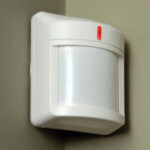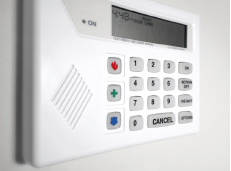Secure It: Options in Monitored Home Security Systems

 Home security systems, like other electronics, have many available features and functions, but all systems can be placed into three different categories: wireless, hard-wired or hybrid (combination of both). Each type of system has advantages and disadvantages.
Home security systems, like other electronics, have many available features and functions, but all systems can be placed into three different categories: wireless, hard-wired or hybrid (combination of both). Each type of system has advantages and disadvantages.
Wireless systems tend to be self-contained, meaning the system is housed in an enclosure that also functions as the system’s keypad. Usually located near the entry that is most frequently used, this is where your security system will be armed and disarmed. One of the advantages of a wireless system is its ease of installation. There’s no need for a large disruption to your walls or what lies behind them. The contacts (used to sense open doors or windows) are wireless and can be installed virtually anywhere. The main board can also use cellular signals to communicate with a monitoring agency
so the only “wire” that is typically needed is for power. A disadvantage of a wireless system is that the batteries in the contacts will need to be changed periodically. Depending on your system, there can be many batteries.
A wired security system uses contacts that are hard-wired from the security panel to the door and window monitoring contacts. Installation of the required wiring for this type system has a much higher labor cost, especially if retrofitting an existing house. New homes are a good candidate for wired systems because the wiring can be installed prior to drywall installation, thus reducing the cost.
 Hybrid systems use the best of both; wired contacts where a wire can be easily installed and wireless contacts for areas wiring installation is impractical or cost-prohibitive.
Hybrid systems use the best of both; wired contacts where a wire can be easily installed and wireless contacts for areas wiring installation is impractical or cost-prohibitive.
Once the best type of system for your home is determined, a decision will need to be made on the contact placement: perimeter contacts (windows and doors), interior contacts (motion detectors) or both? Perimeter placement means that contacts are installed on all windows and doors on the perimeter of the structure that are accessible from ground level. With this type of installation, the security system will alarm when a burglar attempts to gain access through a window or door, which will in most cases deter them from entering at all. When the siren starts to sound as the window or door is opened, occupants are alerted. Interior contacts (motion detectors) cause the system to alarm after the intruder has entered the home or business. Owner preference determines where the contacts are to be installed and whether perimeter contacts, interior contacts or both will be installed. A system with perimeter contact placement will usually cost more than the same system with only interior contacts, due to the number of contacts required. One motion detector can cover an entire room or area where it could take several window and door contacts to secure the same area.
 Monitoring will also need to be considered when installing a security system. Monitoring refers to the security system notifying a UL listed agency when a burglar alarm has been activated. The system communicates with the agency that notifies authorities when the system is in an alarm state. In Virginia, a security system cannot dial 911 directly; it must call a central station licensed to be a monitoring agency. This service requires a monthly fee and can be billed monthly, quarterly or annually. The location of the home or business will often determine if system monitoring will be beneficial. If in a rural area, it can take up to 1 hour for the authorities to respond due to limited resources and distance they will need to travel. Some systems allow for “self-monitoring” which means upon an alarm, the system will dial a designated number, typically the owner, and play a pre-recorded message indicating the security system has experienced a burglar event. This service is typically free, but the authorities are not dispatched to respond.
Monitoring will also need to be considered when installing a security system. Monitoring refers to the security system notifying a UL listed agency when a burglar alarm has been activated. The system communicates with the agency that notifies authorities when the system is in an alarm state. In Virginia, a security system cannot dial 911 directly; it must call a central station licensed to be a monitoring agency. This service requires a monthly fee and can be billed monthly, quarterly or annually. The location of the home or business will often determine if system monitoring will be beneficial. If in a rural area, it can take up to 1 hour for the authorities to respond due to limited resources and distance they will need to travel. Some systems allow for “self-monitoring” which means upon an alarm, the system will dial a designated number, typically the owner, and play a pre-recorded message indicating the security system has experienced a burglar event. This service is typically free, but the authorities are not dispatched to respond.
Most systems today can be controlled with smart phones. You are able to arm and disarm the system as well as receive text messages when various events occur. You may want to know when the kids get home from school or that it’s 9:00am and the system was not armed when you left for work. This can be very handy when installed in a second home or if you just want the peace of mind associated with being able to log into the system and see what is going on at home.
 One final consideration when evaluating a security system is the installation company. In Virginia, all companies offering electronic security services must be licensed as such with the Department of Criminal Justice. The owner can request to see an individual’s registration card and it must be presented. If the installer does not have these credentials, then they have not met the legal requirements for installing such systems.
One final consideration when evaluating a security system is the installation company. In Virginia, all companies offering electronic security services must be licensed as such with the Department of Criminal Justice. The owner can request to see an individual’s registration card and it must be presented. If the installer does not have these credentials, then they have not met the legal requirements for installing such systems.
With the proper planning, a security system will give you peace of mind for many years. With the holiday season approaching and so many things to worry about, knowing your home is protected from fire and thieves brings great peace of mind. Just think, if Cindy Lou Who’s parents had a security system, the Grinch would not have been able to steal her presents and roast beast!






